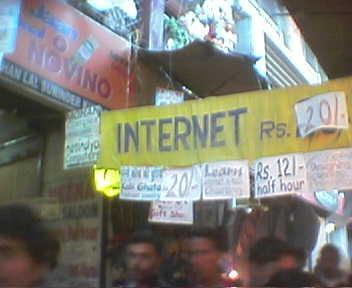Japan Today - Features - Tokyo's 'manga ' cafes serve a restless generation - Japan's Leading International News Network
Tokyo's 'manga ' cafes serve a restless generation
By David Hickey
Manga enthusiasts read comics at i-Cafe in Akihabara.
TOKYO — Whether they be 200-year-old teahouses or modern-day coffee shops, "kissaten" (traditional cafes) hold a special place in Japan's national psyche. These are places where green tea greased the cogs for secret rendezvous between shogun and coup-plotting rebel leaders, and where kimono-clad girls doled out sexual favors over a brew of Vienna's finest. They are also where longhaired hippies could wig out all day on obscure free jazz records for the price of an American blend. A trip to a "kissaten" has long been about a whole lot more than just sipping on a hot beverage.
The latest incarnation of this noble trend, "manga kissa," can be found almost exclusively in metropolitan areas, hovering out of sight a few floors above or below ground level. They play host to a round-the-clock procession of no-nonsense businessmen, bashful teenage couples, students and parents who can leave the kids at the on-site nursery and indulge in a quick fix of manga and mocha.
"Manga kissa" are not new. A style of coffee shop offering a mini-library-sized collection of manga comics available for customers to read on the premises, the first opened in Nagoya in 1979 around the same time that jazz "kissa" were shutting up shop as their once revolutionary-minded clientele got married, had kids and moved on.
But it's only recently that these cafes have become spacious havens where coffee is very much a secondary concern. As the tagline runs at i-Cafe, whose flagship shop can be found on the seventh and eighth floors of a regular looking office building in Akihabara, the modern "manga kissa" is about providing "Time and Space" for the customer, akin to the "ochaya" and "kissaten" of yore. On an average weekday at i-Cafe Akihabara, about 400 customers — mostly businessmen, "freeters" (part-timers) and students — roll through their doors, a number that rises to 600 on a weekend.
Managers insist that there is no "typical" customer. At J-Net Cafe, which lies in an area of Shibuya dotted with similar cafes, "Niwatori," a 20-year-old part-timer from Kanagawa, was about to check out some "shojo manga" — manga for girls that feature "pretty, leggy saucer-eyed heroines in saccharine plots, endlessly falling desperately in love or staring wistfully into space," in the words of Frederik L Schodt's "Dreamland Japan: Writings on Modern Manga."
Customers can use Net, watch DVDs
Nor is it just about manga. Customers can take advantage of high-speed cable Internet access, view the latest DVDs in a reclining chair, or take on other gamers from across the globe in a private booth. They might also grab a two-seat booth with a friend between lectures and kill time with a PS2 or X-Box, or take care of business in a fully equipped "office booth" while stocking up on free food.
Predictably, the Internet has played a major role in the evolution of the "manga kissa." So while Niwatori and his ilk may snub the Net, 33-year-old British animator Trevor, living in Shibuya, came in for an hour to check out some potential eateries online for a date.
Indeed, it's the online experience that's helped accelerate the transformation, and popularization, of "manga kissa" from a dreary coffee shop with a hodgepodge collection of manga with the stigma of attracting only manga-obsessed "otaku," to something resembling a comic book library where the customer can truly feel at home, and be charged not by the cup, but by the hour.
So at home, according to Tomohiro Koizumi, HR manager at Manga Kissa Tanpopo in Ekoda, that while a salaryman surfs the Net, it is not uncommon to find in the booth next door "a customer reading a whole manga series, from start to finish" — no small feat when a single manga magazine may include around 20 serialized stories from a previous volume and run to 400 pages.
Customers can stay the night
Lose track of time and miss the last train home? The vagaries of an expensive taxi ride should be consigned to the dustbin along with last week's "Big Comic Original," since most "manga kissa," including the "Big Three" — Gran Cyber Cafe, Manga Gera Gera and Manga Manboo — have a "nightpack" rate of around 1,200 yen, which is considerably cheaper than the average capsule hotel or love hotel.
Many have a flat seat in which the customer can comfortably settle down in for a night. Some, such as Gran Cyber Cafe, even have a private booth with a flat double seat in which a couple can snuggle up, the modern equivalent of the "dohan kissa" of old, where hard-up lovebirds paid for a coffee before settling down on a two-seater sofa behind a curtain.
Some media commentators continue to oversimplify the link between the seemingly inexorable rise of "manga kissa" and the declining sales of manga. Why would anyone buy the books, the argument goes, when a whole series can be read very cheaply, with free drinks, at a "manga kissa?" But as Edward Venn, a Tokyo-based Canadian publisher who has worked at publishing houses like Shufu no Tomo and Image Publications suggests, even if there is a "threat" from "manga kissa," it could act as a shot in the arm for the manga producers, forcing them "to innovate and improve their ability to compete."
It is up to the manga artists, editors and publishers to rise to challenge. For the rest of us, "manga kissa" let us just kick back and enjoy them.
July 18, 2005
http://www.japantoday.com/e/?content=feature&id=958
Thursday, July 21, 2005
Subscribe to:
Post Comments (Atom)

No comments:
Post a Comment